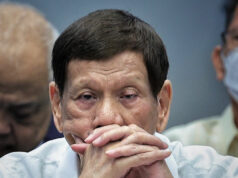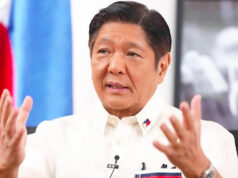Dureza says draft Bangsamoro law ready before Congress reopens
UNLIKE THE previous administration, President Rodrigo R. Duterte’s version of the Bangsamoro Basic Law (BBL) will not be “tinkered” by Malacañang before its submission to Congress, the government’s top peace adviser said on Tuesday.
The BBL will serve as the legal foundation of the future Bangsamoro government in Mindanao. It was approved by the 21-member Bangsamoro Transition Commission (BTC) last June 6.
The draft bill will be turned over to Mr. Duterte at 5:30 p.m. on July 17 in Malacañang in the presence of House Speaker Pantaleon D. Alvarez and Senate President Aquilino L. Pimentel III.
In a press briefing yesterday, Presidential Peace Adviser Jesus G. Dureza said his department will propose the bill to be submitted to Congress “as soon as” Mr. Duterte receives a copy of the BBL.
Mr. Dureza said the wisdom behind the proposal is to allow legislators to exercise their authority over the bill, adding that Mr. Duterte would only “touch” the BBL when he is already asked to approve or veto the measure.
“Let’s not preempt Congress. The final arbiter on what could be the configuration of the new law, if at all it will be passed to replace the BBL in the past, will all depend on what Congress will do….” the country’s top peace adviser said.
“But we are confident that the BTC that crafted the new one must have taken into account the failures of the past, learning from the past lessons,” he added.
Mr. Dureza said his agency would also recommend the certification of the BBL as an urgent legislative measure, doing away with the requirement to approve the bill on second and on final readings on separate days.
The government earlier said it plans to have the draft BBL reviewed by the President before transmitting it to Congress when the legislature resumes its regular session on July 24, which is also the date of Mr. Duterte’s second State of the Nation Address (SONA).
If adopted, Mr. Dureza’s recommendation would be a departure from former President Benigno S. C. Aquino III’s treatment of the previous BBL, which was amended after lawmakers and BTC members had meetings with Mr. Aquino.
Nonetheless, Mr. Dureza said his office’s suggestion is still upon Mr. Duterte’s approval. “The President may have his own wisdom of doing what he thinks is best under the circumstances,” he said.
The last BBL was touted by the Aquino administration as a measure that will bring peace to Mindanao, as it aims to establish political and fiscal autonomy in the region.
But this was effectively derailed by the Jan. 25, 2015, Mamasapano killings — where five civilians, 18 Moro fighters, and 44 members of an elite police force lost their lives in the hands of rebels, following miscoordination among top officials led by then President Benigno S. C. Aquino III.
Originally formed with 15 members, the “expanded” BTC under the Duterte administration has 21 members — of whom eleven, including the BTC chairperson, are from the Moro Islamic Liberation Front (MILF), and 10 nominated by the government.
Meanwhile, the Moro National Liberation Front (MNLF) faction headed by former Cotabato City Mayor Muslimin Sema has also joined the MILF in the new BTC.
However, despite MNLF founding Chairman Nurulaji “Nur” P. Misuari’s recent agreement to join the peace process, Mr. Dureza had earlier said Mr. Misuari’s MNLF faction will not be included in the predominantly MILF-composed BTC.
According to Mr. Dureza, Mr. Misuari will work on drafting an amendment to the 1996 Final Peace Agreement based on the “42 consensus points” that appeared during a tripartite review, adding that the MNLF leader “has not abandoned that.”
The 1996 peace deal paved the way for Mr. Misuari’s leadership of the ARMM or Autonomous Region in Muslim Mindanao from that year until the early 2000s.
“So Congress will have to look at both and then find out how they can harmonize, how they can converge both proposals,” Mr. Dureza said.
Members of both the MILF and its original mother organization, the MNLF, had been reaching out to each other of late. The MILF broke away from the MNLF in the 1980s.
Upon taking office, Mr. Duterte launched a broad peace-and-order effort, including talks with communist and Bangsamoro rebels that, if successful, may unlock the stunted economic potential of conflict-affected areas in Mindanao and elsewhere.
On another matter but still related to the peace process, Mr. Dureza yesterday said the state’s chief negotiators will take the President’s guidance as both the government and communists prepare for the resumption of talks in August.
This was after Mr. Duterte said in a recent interview that he would not allow the negotiations to proceed if communists will not stop their extortion activities.
“I’d like to tell you in advance that under the CARHRIHL, the Comprehensive Agreement on Respect for Human Rights and Humanitarian Law signed in 1998, the CPP-NPA and the Government of the Philippines committed (their efforts), and among the provisions there is not to subject civilians and their properties to attack,” Mr. Dureza said. — Ian Nicolas P. Cigaral



